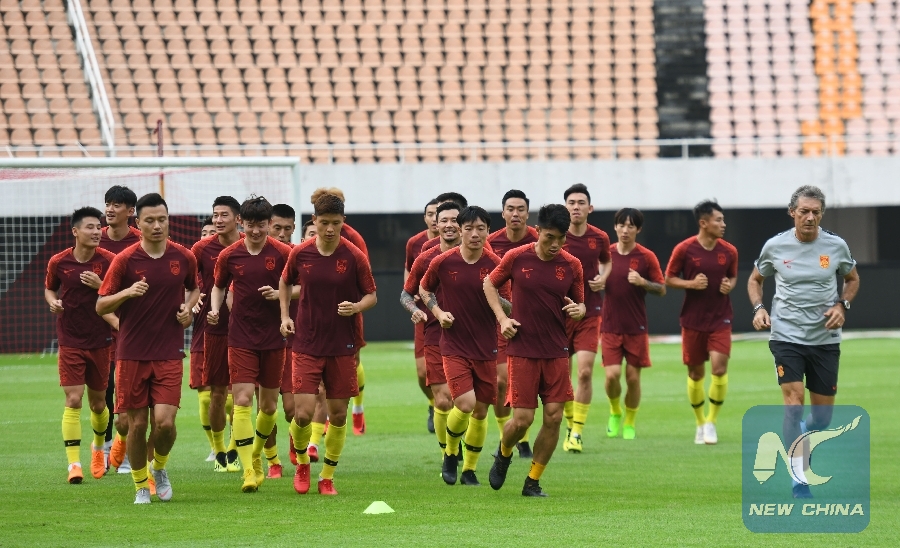
The Chinese football men's national squad was training in Guangzhou, South China on Semptember 3, 2018, preparing for a series of warm-up friendlies. (Deng Hua/Xinhua)
By Sportswriter Wang Haoyu
BEIJING, Dec. 18 (Xinhua) -- Can we call 2018 a landmark year for Chinese football?
From a long-term perspective, China is making steady progress in its football reform and development plan which was introduced in 2015 in an effort to transform the country into a footballing powerhouse by 2050.
However, the performance of China's national teams is still far from where the Chinese Football Association (CFA) and the country's football fans would like it to be.
Defining success is difficult for the CFA. Should they mainly fight for qualification to the 2022 Qatar World Cup by making some short-term adjustments or should they instead take a long-term view and build a solid base for youth training?
"Football is long-term project for China. We talk about one to two generations until China can reach a level to compete successfully at a World Cup," former Guangzhou Evergrande youth coach Marco Pezzaiuoli said.
"China's effort in football as education has already started in primary schools as government programs lead to countrywide progress. But Chinese football is still young and deserves... time to catch up and develop." To be sure, China has made serious gains in the areas that Pezzaiuoli mentioned.
According to the Ministry of Education (MOE) a total of 3,916 middle and primary schools across China have been identified as schools specializing in youth football. In addition, there are 33 pilot counties and districts for campus football, as well as 47 units across the country that are verified as training camps for the sport. Making use of international avenues is another way for China to develop its young talent into top-class players.
The CFA and Spain's La Liga announced recently that they will establish a permanent training center for Chinese youth teams and coaches in Madrid this December.
"The project includes football training, but also academic and cultural education,as well as playing games and training. The boys will also go to 8 hours of classes a day and learn languages such as Spanish and English," Martina Olivas, the International Deputy Director of La Liga said.
As part of the training project, the Chinese U-15 football team is preparing for a 10-month training stint at the center. These young players will face the youth teams from Real Madrid, Atletico Madrid and Getafe during their time in Spain.
But there is more to consider for China than just its performance on the training pitch. The CFA has to consider whether the national teams can qualify for the 2020 Tokyo Olympics and the 2022 World Cup.
Although China will not lose sight of these goals, this year, it realized that it should not sacrifice the interests of the domestic leagues even as it pursues international ambitions.
There was a rumor that the Chinese national team would compete in the Chinese Super League (CSL) next season as preparation for the 2022 World Cup, but the CFA has already denied this speculation in November.
Instead of making the controversial decision, the CFA is planning to introduce a series of positive reforms for domestic leagues, including a salary cap and a bonus cap next season. These reforms will cover the Chinese Super League, China League, and China League Two.
"The regulations hope to curb 'irrational' investment and promote healthy and sustainable development of professional leagues," sources with the CFA told Xinhua in November. Although the CSL has begun to attract more and more attention worldwide, there is still a big gap between the Chinese men's national team and the top teams, even in Asia.
Marcello Lippi, who has been in charge of the Chinese senior side since 2016, expressed disappointment in his team after they won only three of their nine international matches this year.
The 70-year-old has publicly declared he will retire from coaching once his contract with China expires early next year, which means the Chinese men's national team will have to rebuild after the 2019 Asia Cup.
Veteran Dutch coach Guus Hiddink has been appointed as the head coach of China's U-21 national team this September. His team will compete for the chance to play at the Tokyo Olympics in 2020. The former Dutch national team manager knows how difficult the task ahead really is.
"It would be very difficult, because they have never qualified. Only as host nation were they present in 2008. But I would like to take the challenge," said the 71-year-old. For Hiddink, his challenge is to get the team to the Tokyo Olympics, but for Chinese football, the challenge is not only on the pitch.

